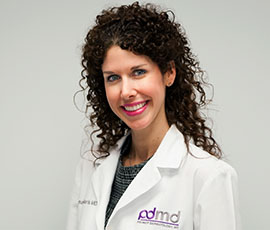Teledermatology is now available at PDMD!
Coronavirus Update

2020: year of self-care
A new decade is upon us. A new year. New chances to improve ourselves and our lives. And step one is self care: taking the steps for physical and mental well-being. One important part of self care is giving your skin some love! At pdmd, we take a comprehensive approach to skin care, from lasers to fillers and botox to tailored skin care regimens and of course, facial services. This month, to kick off 2020 the right way, we are offering a special promotion with our amazing aesthetician, Audrey: a signature facial with microdermabrasion (1 hour long total treatment).
What is microdermabrasion?
Microdermabrasion is a painless, non-invasive procedure where a handheld applicator is used to stream super fine crystals and then vacuum/suction them to gently exfoliate the superficial, dry layers of the skin. The technique stimulates blood flow, resulting in glowing skin. The suctioning helps to unclog stubborn pores and improve mild acne. Collagen production is stimulated, improving the appearance of fine lines and wrinkles. There may be mild redness for a day or two, but generally, there is very little downtime.
Microdermabrasion can be combined with other treatments offered during a facial, such as masks and chemical peels. Ask us about it at pdmd!
Happy New Year and wishing everyone beautiful, healthy skin!
New Kid on the Block
And no, not Jordan, Joey, Donnie, Danny or Jonathan.
We're talking about the newest kid on the block for beauty! Jeuveau (prabotulinumtoxinA-xvfs) is the new FDA-approved injectable treatment to temporarily improve the look of frown lines. Jeuveau joins the FDA-approved toxins that are currently on the market: Botox, Dysport, and Xeomin. Having another option is always a good thing!
Hating the lines on your face but still hesitating? Let us clear up some common misconceptions.
"I'm afraid I'll look wierd."
With proper technique, a very natural, more youthful result can be achieved. Botox, Dysport, Xeomin, and now Jeuveau can smooth the "eleven" lines between the eyebrows, which make people appear angry, even when they're not. It can relax lines across the forehead, as well as crow's feet. It can stop wrinkles on the nose (bunny lines), a dimpled chin (golf ball chin), and tight neck bands. It can even slim the face when injected into the masseter muscles. A board certified dermatologist with cosmetic experience has the training necessary for beautiful, natural, "non-wierd" results. Please note that injections outside of the glabella are considered off-label.
"I don't think it's safe."
Botulinum toxin has been used in millions of patients worldwide for more than 20 years in the treatment of both medical and cosmetic conditions. While there are certain patients that should not have the treatment (those with an allergy to the product, certain neuromuscular conditions, those pregnant or nursing), when used correctly, it is overall a very safe treatment, with serious side effects being very rare.
"I don't want to look worse once it wears off."
The effects of neurotoxins last about three months. It works by temporarily stopping the release of a chemical from nerves called acetylcholine which instructs muscles to contract. After a short period of time, the nerves begin releasing the chemical again, and the muscle will contract, just like they did before. Wrinkles will return to what they were before the treatment.
Botulinum toxin injections are one of the most popular cosmetic procedures performed worldwide. With no cutting or downtime, a little can go a long way.
Ask us at pdmd which toxin is right for you!
May is Skin Cancer Awareness Month
Categories
- November 2014 (1)
- December 2014 (3)
- January 2015 (4)
- February 2015 (3)
- March 2015 (1)
- April 2015 (3)
- May 2015 (4)
- June 2015 (2)
- July 2015 (0)
- August 2015 (1)
- September 2015 (2)
- October 2015 (4)
- November 2015 (1)
- December 2015 (1)
- January 2016 (2)
- February 2016 (1)
- March 2016 (3)
- April 2016 (2)
- May 2016 (1)
- June 2016 (1)
- August 2016 (1)
- October 2016 (1)
- January 2017 (1)
- February 2017 (1)
- June 2017 (1)
- August 2017 (1)
- October 2017 (1)
- December 2017 (1)
- April 2018 (1)
- May 2018 (1)
- November 2018 (1)
- May 2019 (1)
- July 2019 (1)
- January 2020 (1)
- March 2020 (2)
- July 2020 (1)
- November 2020 (0)
- January 2021 (1)
- October 2021 (1)
- January 2022 (1)
- June 2022 (1)
- November 2022 (1)
- April 2023 (1)
- September 2023 (1)
- September 2023 (1)
- December 2023 (1)
- February 2024 (1)
- July 2024 (1)
- September 2024 (1)
- March 2025 (1)
- October 2025 (1)
Archives
Latest on blog
The fountain of youth: collagen!
Published September 30th, 2025These days, everyone is searching for the elusive Fountain of Youth. But dermatologists know what...
Learn More
